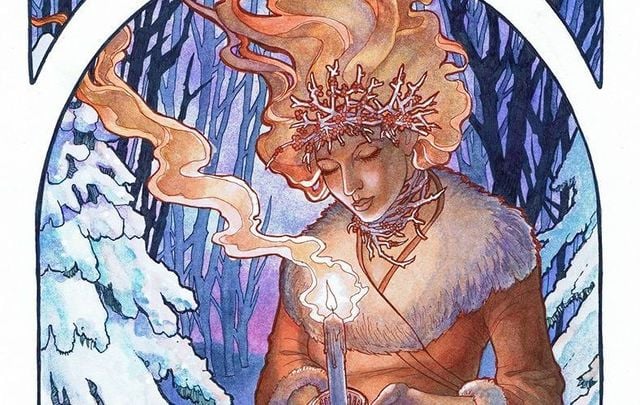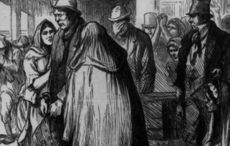Spring in Ireland traditionally starts on St Brigid's Day, February 1. However, this may not be entirely historically accurate as it is a celebration with roots a long way back in pre-Christian times, some 6,000 years ago, when no written tradition existed.
As was the case in many ancient cultures around the world, female deities ruled supreme, making the similarities between Egyptian mythology and Irish mythology quite remarkable.
For example, most people will be familiar with an Egyptian ritual from "The Book of the Dead" of Isis breathing life into the mummified corpse, but many may not know that the same scene is depicted in stone at the foot of a high cross in Ireland.
Brigid, the highly revered Celtic goddess, beloved by poets
Similarly, our Goddess had a sacred cow that suckled a king, the same as Queen Hatshepsut in Egypt. India and many other cultures revere the cow as a symbol of nurturing. In fact, up until the 12th century, children were baptized with milk in Ireland.
Fascinating or obvious, these ancient races relied on the land, so it is no wonder they revered the female goddesses that embodied and symbolized mother earth for them. The goddess had to be appeased and celebrated to ensure the fertility of the land, animals, and people.
Celtic mythology holds that the chieftains slept with the goddesses in a mating ritual that crossed the boundaries of physical and metaphysical, as these goddesses could shape-shift into birds and other mythical creatures. She could be "an old hag" in human form standing at a crossroads, or the triple goddesses "Moriggan" in the tale of the Tain, or the "Banshee" in later years foretelling death in a family.
When the Celtic goddess Brigid became a Christian Saint by the same name
Having infused tradition in Ireland with a mixture of reverence and fear, for thousands of years prior to Christianity creeping into Ireland, it is highly understandable that our ancestors would have been a tad reluctant to banish her completely, which coincidentally is about the time she seems to have morphed into the Christian St. Brigid we know about today. Although the signs were there from the start that this was no ordinary mortal woman.
It is said that the Irish never let the truth get in the way of a good story. And so the story goes, that when St. Brigid was trying to wrestle enough land from the high king of Leinster to build her monastery in Kildare, he said that she could have as much land as her cloak would cover. Whereupon Brigid laid down her cloak and it magically spread out to cover several hundred acres.
Beannachtaí na feile Bride - "greetings of the feast day of Brigid on you." In other words, "Happy St. Brigid's Day!"
For more from Susan Byron, visit www.irelands-hidden-gems.com.
* Originally published in 2016, updated in Jan 2025.




Comments